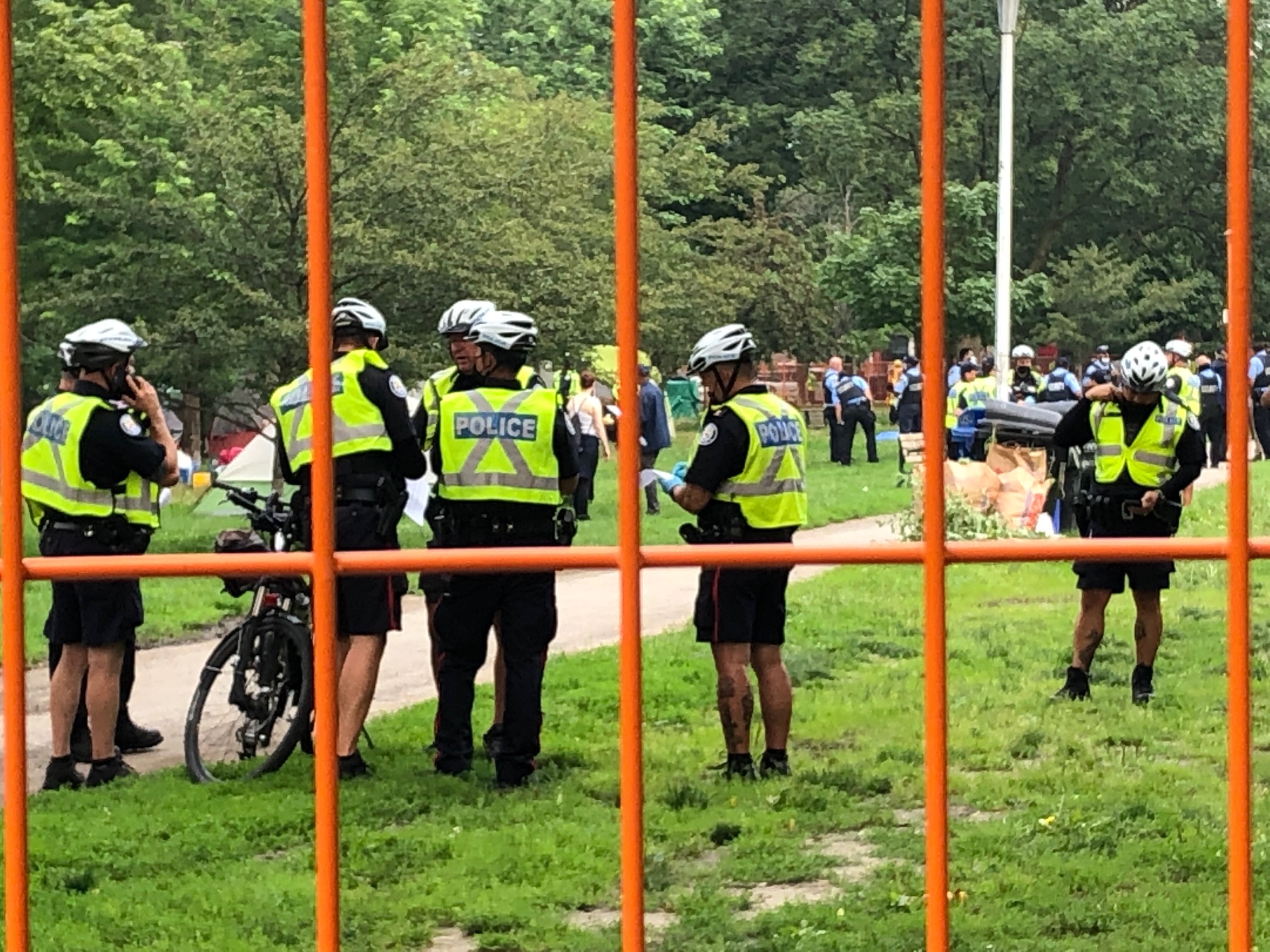The City of Toronto knows how to throw a military operation: employ a police drone and heavy surveillance methods, erect a fence to secure and close a park or kettle people inside, limit journalists’ access, threaten hefty fines or arrest people if they don’t leave, and bring in security guards and police to ensure city staff can remove homeless people plus their belongings and then bulldoze their tiny shelters.
All of this for a couple dozen people.
This week’s eviction of the Alexandra Park encampment is the second violent eviction of a homeless encampment in Toronto in a month. The first at Trinity Bellwoods Park was national news given the city’s militarized approach and immense solidarity by supporters from all walks of life.
Since writing this, on July 21 Toronto enacted yet another encampment eviction at Lamport Stadium.
The pattern has repeated itself for over a year and has full approval of Mayor John Tory. This is how it goes: city officials give eviction notices, city workers increase their frequency of “wellness checks” with the pretense that safe housing or safe indoor space will be found, reports of fire and unsafe conditions are exaggerated necessitating urgency to evict. There is evidence on shelter bed unavailability, unsafe conditions, lengthy social housing wait lists, let alone concerns about COVID-19 in shelters and shelter hotels. When city council and Tory ignore the COVID science and recommendations from the Centre for Disease Control in Atlanta (CDC), it is a public health disaster waiting to happen.
In the updated CDC recommendations on homelessness (July, 2021):
“If individual housing options are not available, allow people who are living unsheltered or in encampments to remain where they are. Clearing encampments can cause people to disperse throughout the community and break connections with service providers. This increases the potential for infectious disease spread.”
Toronto’s medical officer of health Dr. Eileen de Villa has remained largely silent on homelessness throughout the pandemic.
Perhaps even worse, Mayor Tory and city council ignored pleas from experts and homeless people who offered a peaceful, alternative approach. Titled “Encampments to Homes — A Path Forward” the open letter, co-written by the Toronto Drop-In Network, was signed by over 200 organizations and individuals, including front-line agencies, Social Planning Toronto, doctors, nurses, former and current politicians including former Toronto mayor John Sewell and an array of artists and musicians who have really stepped up to be strong advocates in this pandemic.
The letter reads:
“Using armed police officers on horseback and in riot gear to remove residents who are vulnerable to Toronto’s unaffordable housing market due to inadequate social supports, has no place in a caring, compassionate society. Instead, we must commit to taking a human rights compliant approach toward housing encampment residents that is co-created with encampment residents.”
The letter goes on to outline a 15-point plan towards a human rights compliant approach towards encampments.
In a brilliant article “Encampment evictions: Another face of colonial violence in Canada,” academic and activist A.J. Withers and legal academic Azeezah Kanji distill the multiple layers of state violence evident in governments’ approaches to unhoused people, including chronic underfunding of housing and social assistance, persistent refusal by courts to recognize the right to housing, spatial violence including hostile architecture in parks, and evictions.
In the words of an encampment resident today: “This is just the mayor being a bully, to seniors, to women, to the handicapped [sic]. Where does he think people will go?”
Cathy Crowe is a street nurse, author and filmmaker who works nationally and locally on health and social justice issues.
Image: Rafi Aaron/Used with permission




